A common concern for new users of CBD products is whether you can drive after taking CBD oil in Australia.
This concern extends to people who use medical cannabis, too, because of its increased adoption.
Due to CBD oil now being legal in the country, drivers must be aware of whether CBD can be used before driving.
Knowing the dangers involved in taking any health product is vital before taking it, particularly for any product that has the potential to impact your driving abilities.
Australia has stringent drug driving laws that prohibit any amount of THC from being present in a driver’s system, regardless of whether they are intoxicated. These laws are enforced using random roadside drug testing. Such tests check for the presence of THC in a driver’s body to a very high degree of sensitivity.

But while THC is screened in drug tests for drivers, CBD isn’t.
This makes it safe to drive after taking CBD oil or CBD gummies. These products don’t cause motor skill impairment or intoxication.
But if you’re a driver who uses CBD products, there are still some risks involved in doing so.
These risks are the result of some CBD oils containing trace amounts of THC in them.
For instance, full-spectrum CBD oil can have up to 0.3% THC, which can cause a positive roadside drug test even if it doesn’t intoxicate you.
It’s possible to ingest THC this way accidentally. You can be exposed to legal risks or lose your driver’s license.
So before you drive after taking CBD oil in Australia, give this guide a read. We’ll detail the pitfalls and risks to be aware of. Plus, you’ll get handy tips on how to mitigate, avoid or eliminate these risks. This will keep you safe and help you avoid legal problems on Australian roads.
Contents
Can You Drive After Taking CBD Oil in Australia?
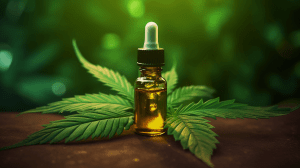
You can drive after taking CBD oil in Australia, provided you can guarantee your product is pure and 0% THC. If so, it’s entirely safe to drive as CBD itself won’t impair you and is legally allowed for drivers.
It’s not safe, however, to drive using medical cannabis or any product containing THC. Avoid this.
Risks for drivers who use CBD oil can occur because of accidental THC consumption (even in trace amounts). THC is unsafe for drivers because it affects reaction time and motor skills. Additionally, it’s illegal to have any amount of it in your system while driving in Australia.
Roadside Drug Tests (RDT) are used to screen for the presence of THC in a driver’s body. These tests are regularly performed across every area of Australia. You can be stopped on the road and tested at any time, like being tested for drunk driving (roadside breathalyzer tests).
The driver drug screens used in RDTs are saliva swab immunoassay tests. They’re incredibly sensitive and precise. Immunoassay screens check for the presence of the THC metabolite 11-Nor-9-carboxy-Δ9-tetrahydrocannabinol (TH-COOH).
A metabolite is a compound produced during metabolic processes. In this case, the process is the breakdown of THC within the liver. TH-COOH is one of multiple metabolites created as a result of this process. Immunoassay screens can detect it in tiny amounts.
What this means is it can be unsafe for drivers who take CBD oil to drive in specific scenarios.
Risks of CBD Oil for Drivers
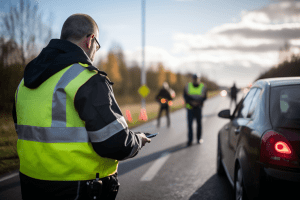
These scenarios can play out by accident or from not sourcing quality products where they have accidentally consumed small quantities of THC. The main scenarios this can occur are:
- Mislabelled or Contaminated CBD Products: THC is commonly found in CBD oil produced with subpar techniques. These products won’t have a robust extraction and filtration process to remove it. Often, they are also mislabelled as 0% THC when, in reality, they contain high quantities of it.
- Full-Spectrum CBD oil: in Australia, full-spectrum CBD products can have up to 0.3% THC. With daily use, the THC can build up in your system. In turn, you can fail a roadside drug test, even if you don’t feel impaired.
- Medical Cannabis Patients (THC Users): some medical cannabis users also take CBD oil regularly. They may have already built up THC in their body’s fat cells at detectable levels. While CBD oil use won’t impair them, if they drive, they can still fail a drug test.
What makes these risks even more significant for drivers is how long THC stays in your body.
THC’s Longevity in the Body
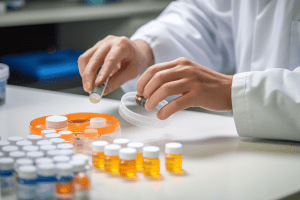
Both THC and TH-COOH are fat soluble. Your body will store each in its fat cells. They are then released and cleared slowly by the body (determined by the compound’s half-life). Frustratingly, both can also accumulate in fat.
In other words, the quantity and frequency of THC consumption will affect how long it stays in your system. For daily users of cannabis, it can take many weeks or months for it to be fully cleared to undetectable levels.
Yet CBD oil users taking full-spectrum products can suffer from similar issues. Trace amounts of THC in this oil type will build up if you’re taking it often. Likewise, for mislabelled CBD oil or contaminated products, the more you use them, the greater your driving risks.
These factors make it incredibly vital to only use pure CBD oil if you drive. Consuming any quantity of THC puts you at risk. But this risk is entirely avoidable.
Is Driving on CBD Oil Legal in Australia?

CBD oil is legal to use when driving in Australia under regulation. The CBD cannabinoid doesn’t intoxicate or cause delayed reaction speeds, which is why it’s regulated differently from THC.
The caveat is that the CBD oil used by a driver must be 0% THC.
Pure CBD itself won’t cause you any issues if you are drug tested whilst driving. You won’t fail a drug screen in these cases because there won’t be any amount of TH-COOH in your body.
The exception is where your CBD product is contaminated with THC.
Is CBD Oil Safe to Use While Driving?
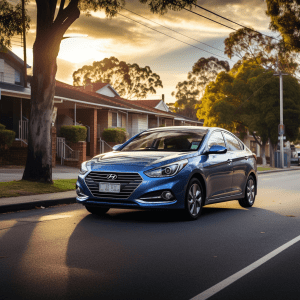
CBD oil is safe to use while driving because it has no intoxicating properties and can’t affect your driving skills.
It isn’t a sedative or sleep agent, so it doesn’t risk impacting your reaction times. On the contrary, CBD oil benefits most people in mental clarity, calmness and concentration.
However, there are some cases where using CBD oil affects your driving. Primarily, these are:
- Excessive Consumption: taking doses far above the appropriate or recommended amount will amplify side effects like drowsiness. In turn, this can sometimes impair driving skills. The strength of the CBD product also plays a crucial part in this risk.
- Side Effects: CBD can have side effects that impact driving capacity. For example, it can cause drowsiness, lethargy, light-headedness or dizziness from blood pressure changes in some individuals. These issues are more likely to occur amongst new users of CBD or those with underlying health conditions.
- Underlying Health Conditions: individuals with blood pressure problems or other health conditions can be more susceptible to CBD’s side effects while driving. These drivers must be extra cautious and conservative when driving after taking CBD oil.
Exercising self-awareness and being prudent about your physical state are essential safety factors for drivers. Especially so when consuming CBD gummies or oil regularly.
If you think you aren’t up to driving or are experiencing any side effects, avoid doing so.
It’s better to stay safe than attempt to drive. Seek alternative transport or wait until the feelings pass.
Keep in mind that CBD doesn’t have any psychoactive properties. It’s entirely distinct from THC and won’t alter your cognition. In most cases, the opposite is true. Many drivers find they’re calmer, more attuned and focused while using it.
Evidence of Safety

The expansion of use in products like CBD oil and CBD gummies inevitably raised concerns from many governments worldwide (including in Australia) regarding road safety. Because these products are fundamentally extracts from cannabis, there was, of course, initial worry they would cause motor skill impairment.
An increased potential for motor accident risk was a paramount item these governments had to thoroughly assess in considering their legal treatment of CBD.
The need for these risk assessments leads to several scientific studies being requisitioned on CBD’s impact on driving ability.
In particular, these studies sought to understand whether CBD oil would reduce reaction times and judgement for drivers.
For example, a Lambert Institute (part of the University of Sydney) study from 2019 explored how both cannabis and CBD affected driving skills. It assessed driver performance in a real-world testing scenario on public highways in the Netherlands. Twenty-six adult subjects were administered differing cannabis products. Some products contained only CBD to isolate its effects on drivers. The driving test measured how each driver steered, reacted, positioned their vehicle and judged distance after being dosed. In concluding the study, the researchers found CBD had no detrimental effects on driving abilities. THC, on the other hand, was shown to produce mild reductions in driver skill at moderate doses.
Additional Research
A separate study from the Journal of Psychopharmacology demonstrated similar results. It tested 17 drivers dosed with CBD oil on reaction time, motor skills and driving judgement. Subjects were given CBD oil in one of three daily doses (150mg, 300mg, or 1500mg). A placebo group was used for comparison purposes. Before and after taking their doses, participants completed tasks on a driving simulator. The functions involved following safely behind another car and driving along different types of roads.
Changes to each driver’s reaction speed and motor control were measured during simulation tests. In addition, each participant was tested for cognitive function and perception whilst driving in the simulator. The researchers found that drivers given CBD oil had no driving ability or reaction speed reductions. It also displayed no changes to their cognitive performance or decision-making whilst being tested.
These studies add further evidence to the safety of pure CBD oil for drivers. When used appropriately, it poses no real risks. However, the risk of using medical cannabis for drivers is still genuine.
Can You Drive After Using Medical Cannabis in Australia?
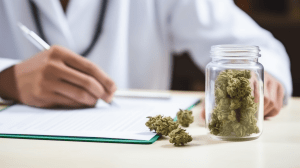
It’s not safe or legal to drive after using medical cannabis in Australia.
Medical cannabis contains THC, which will reduce your reaction times and ability to drive.
As such, it can pose substantial safety risks to you and others on the road.
Don’t drive if you’ve consumed medical cannabis.
This includes:
- Cannabis flower
- Cannabis oil
- Medical cannabis vaporisers
- Any form of cannabis edibles
The law in Australia has a zero-tolerance policy for any amount of THC in your system while driving.
Although you might not feel impaired or intoxicated, you can still fail a roadside drug test.
Even if you haven’t used medical cannabis recently, THC can still be present in your body due to its long half-life and fat solubility.
So how long should you wait before driving?
How Long Should I Wait to Drive After Using Medical Cannabis?

Judging the right amount of time to wait before you drive after using cannabis medications can be challenging.
It’s only safe to drive once the body has cleared the TH-COOH metabolite to non-detectable levels.
This guarantees you won’t fail a roadside drug test when driving in Australia.
But judging how long this process will take is tricky.
The time it takes for TH-COOH to clear varies substantially between different people.
There is considerable variability in how different individuals process THC and the time it takes for their metabolism to clear it. Factors like body size, liver health, cannabinoid tolerance, and genetics play a part.
The quantities of medical cannabis you’ve consumed are also significant.
How much THC you’ve used and how often will substantially affect the amount of it that gets stored in your body. Subsequently, this impacts how much TH-COOH will be detectable in your body when you’re drug tested.
Even if you haven’t used any medical cannabis products in weeks, you might still have trace levels of TH-COOH in your system. This risk increases the longer you have used products containing THC before the test. Instead of guessing how long to wait, it’s better to drug test yourself before you drive. Use an immunoassay test as accurate as those used by police so you can check for the presence of TH-COOH. Any other method you use to gauge how safe driving will be will be guesswork. Think of this similar to breathalysing yourself before driving when you’ve been drinking. You’ll be able to tell whether you are at risk or not quickly.
Is it Safe to Drive After Using Cannabis Medications?
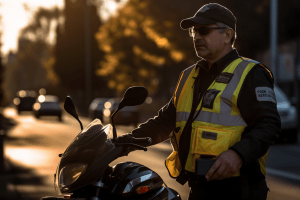
Any cannabis medication containing THC is not safe to drive on. This applies both to when you’re intoxicated or if you have any TH-COOH metabolite in your body when driving.
THC is dangerous for driving due to its psychoactivity and intoxicating properties.
For drivers, it causes many detrimental effects, such as:
- Lowering driving reaction speed
- Increasing impulsiveness
- Impairing cognition and decision-making
- Causing anxiety and paranoia
Each of these properties affects driving performance. This leads to a much greater chance of accidents.
Drug Driving Consequences

Getting it wrong and driving with THC in your system carries dire consequences. These extend beyond increasing your risk of injury or death while driving.
Some of the other significant issues you can face include:
- Criminal DUI Charges: drug driving (having THC in your system) is a form of driving under the influence (DUI) offence in Australia. This is a criminal offence. You’ll get a criminal record if charged. You can then be barred from many jobs, such as government work, banned from entering many countries and will have this record permanently. It can also mean jail time for serious or repeat offences.
- Driving Restrictions: A DUI charge often results in losing your license, getting your car impounded, or losing your driving rights. This is a severely negative outcome if you rely on your vehicle for work or transport. It could impact your livelihood.
- Legal: whoever you injure or whose property you damage while driving under a DUI will be able to make legal claims against you. In particular, you will have to pay any costs for repairs to their vehicle or property. Personal injury claims can also be made against you. The legal expenses incurred from drug driving can be very significant.
- Insurance: many insurers in Australia won’t cover you for a DUI accident. Some insurers also cancel the policy of drivers involved in these accidents due to criminal offences. If caught out, you can have a much larger accident bill than you anticipated.
- Reputation Damage: with criminal charges to your name from a drug driving offence, the reputation damage you suffer can be substantial. It can lead to losing your job, friends abandoning you and negative perceptions from your community.
It’s vital to protect yourself if you use CBD oil or medical cannabis as a driver. Don’t risk these entirely avoidable consequences.
Safety Precautions for Drivers Using CBD Oil in Australia

You can take a few precautions to protect yourself as a driver using CBD oil in Australia. Some of these tips also apply to medical cannabis users.
Tips to reduce risk are:
- Use CBD Isolate Oil: these products undergo additional processing during manufacturing to eliminate all quantities of THC. While still effective, isolate CBD oil has the added advantage of providing peace of mind. Using a 0% THC product ensures you can’t fail a drug test when driving.
- Avoid Full-spectrum CBD oil: due to being much less refined, full-spectrum formulated CBD products are higher in THC. Legally, they can contain up to 0.3% concentration of THC in Australia. This poses a real risk for drivers using these products regularly. The trace quantities of THC will build in your system and eventually be detectable in roadside drug tests. In addition, they contain amounts of THCA, a non-psychoactive minor cannabinoid that can cross-react with drug tests. It often causes false positives for THC. Like THC, it can also accumulate in your body’s fat and substantially increase your risk of failing an RDT. Prevent these risks by using 0% THC products only.
- Get a Certificate of Analysis: these are analyses performed by third-party, independent laboratories that provide high-accuracy information on a CBD product’s cannabinoid concentrations. Obtaining a certificate for your product lets you know if it has any THC in it. If your provider doesn’t have it listed on their website, request it directly.
- Drug Test Yourself: if you suspect you’ve consumed THC as a driver, an excellent way to check is to purchase a high-accuracy drug testing kit. In particular, look to buy the immunoassay saliva tests used by Australian police to ensure the testing standard aligns with what is used for roadside drug tests. Drug testing yourself before driving helps you avoid guesswork on whether it’s safe to drive. Like breathalysing yourself if you’ve been drinking, it’s the only way to know how safe driving will be if you have THC in your system.
- Avoid low-quality CBD products: products that are cheaply made and don’t prioritise quality control are risky to use because of their potential to contain THC. This can occur accidentally through incidental contamination during production, from sub-standard extraction processes, or even mislabelling. Usually, these products won’t have lab tests available (if they use any testing). If you’re a driver, using additional caution when buying CBD oil in Australia is critical. Opt for quality, not low price. Only buy from trustworthy CBD stores with lab analyses on their products.
A final tip is to use your judgment when using CBD oil if you drive. Don’t get behind the wheel if you feel tired or sleepy. Similarly, if you believe you could have THC in your system for any reason (even accidentally), don’t drive.
Conclusion

Although you’re able to drive after using CBD oil in Australia, there are precautions to take before doing so.
Pure CBD oil, which only contains the CBD cannabinoid, isn’t a problem.
CBD itself isn’t screened for in roadside drug tests. It’s also not intoxicating or a risk for those worrying about its effects on driving abilities. This has been proven in multiple studies.
What you need to worry about is the THC cannabinoid. In contrast to CBD, it’s hazardous for drivers in Australia.
THC increases crash risks. Having any in your system while driving isn’t tolerated by the law in Australia. You will face criminal charges if you’re caught in this scenario.
Problematically, for CBD oil users, THC is often found in CBD products. You’ll need to be very careful to steer clear of it by sourcing 0% THC CBD isolate only, plus vetting your provider and their product’s lab analysis.
FAQs

Whether CBD oil shows up on a roadside drug test in Australia will depend on the formulation and quality of the product you consume. These tests screen for metabolites of the THC cannabinoid, which is illegal to have in your system while driving. CBD, on the other hand, isn’t screened for due to being non-psychoactive.
For CBD oils, which are isolated formulations and contain 0% THC, there won’t be a risk of failing a roadside drug test while driving in Australia.
However, products that are ‘full-spectrum’ formulations can have up to 0.3% THC in them. This poses a risk of failing roadside drug screening. The THC in full-spectrum CBD oil can accumulate in your system over time and is slow to be cleared. This poses a risk of its metabolites being found in your body as a drive, even if you aren’t impaired at all.
You can drive with CBD oil in your car in Australia, provided it was purchased legally. If stopped by police, you may need to provide evidence of this. Carry your CBD prescription with you in the car to verify the medical origin of your product. Alternatively, bring your receipt if you purchase CBD oil over the counter in a pharmacy. This will validate that these products are legal and can be carried by you.
CBD, on its own, is not known to cause impairment or interfere with driving abilities. In some users, it may cause drowsiness or lethargy, which can have some influence on driving skills. If you are experiencing any side effects from CBD, it’s best to avoid driving until they pass. CBD is non-psychoactive and does not cause reductions in motor function associated with risks to driving.
However, it’s essential to consider the potential effects of other components in CBD products, especially if they contain any amount of THC. THC can impact driving skills. CBD oil users should be aware of the product’s cannabinoid content and ensure it contains no THC.
References
- Arkell, T.R., Lintzeris, N., Kevin, R.C., Ramaekers, J.G., Vandrey, R., Irwin, C., Haber, P.S. and McGregor, I.S. (2019). Cannabidiol (CBD) content in vaporized cannabis does not prevent tetrahydrocannabinol (THC)-induced impairment of driving and cognition. Psychopharmacology, 236(9), pp.2713–2724. https://link.springer.com/article/10.1007/s00213-019-05246-8.
- McCartney, D., Suraev, A.S., Doohan, P.T., Irwin, C., Kevin, R.C., Grunstein, R.R., Hoyos, C.M. and McGregor, I.S. (2022). Effects of cannabidiol on simulated driving and cognitive performance: A dose-ranging randomised controlled trial. Journal of Psychopharmacology, p.026988112210953. https://journals.sagepub.com/doi/10.1177/02698811221095356.
- www.medicinalcannabis.nsw.gov.au. (n.d.). Driving | Centre for Medicinal Cannabis Research and Innovation. [online] Available at: https://www.medicinalcannabis.nsw.gov.au/health-professionals/driving#:~:text=It%20is%20illegal%20for%20patients.
- honahlee. (n.d.). Get The Facts: Cannabis, CBD Oil & Driving In Australia. [online] Available at: https://honahlee.com.au/articles/cannabis-cbd-oil-driving/.
- Australian Journal of General Practice. (2021). Medical cannabis and driving. [online] Available at: https://www1.racgp.org.au/ajgp/2021/june/medical-cannabis-and-driving.
